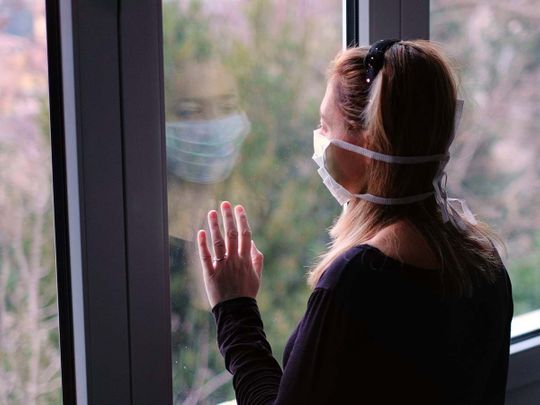
Dubai: People who are asked to quarantine at home when found COVID-19 positive but are asymptomatic or display mild symptoms generally feel relieved that they can remain in their familiar surroundings, but once the 14-day isolation begins, they realise that this is easier said than done.
Remaining in a confined space, locked in a room where you can only hear the voices of your loved ones but not physically see them is a tough call. It can make one claustrophobic, triggering depression, insecurity, feeling of abandonment and rejection, say psychologists. That is the point at which an asymptomatic individual feels tempted to step out, in the process starting the chain of community transmission. Recently, Dubai Police apprehended and fined one such home quarantined individual who posted his photograph on social media while stepping out to buy a coffee from a local coffee shop. Such behavior has to be avoided at all costs.
Two residents who were COVID-19 positive recounted the steep learning curve that they went through. Speaking to Gulf News, they advised people to take precautions and follow the rules.
Don’t let your guard down
Dr Maazuddin Mohammad, general practitioner with the Aster Volunteer Service, who had been working throughout the pandemic assisting COVID-19 patients, recently tested positive for COVID-19 and had to go on home quarantine. Still quarantined in one of his bedrooms at home, Mohammad told Gulf News: “I never tested positive while I was working with patients, but recently I had to go to India for a personal visit and upon arrival back in Dubai, I tested positive. Since I had no fever, fatigue, dry cough or any symptoms, I was asked to quarantine at home and have been observing the same since October 4. As a doctor, I have often advised people to follow the strict rules of isolation, but now that I am doing it myself I realise how challenging it is, especially in cases where there is sharing of living space with others,” said the father of a four-month-old kid.

Dr Mohammad said though it was difficult to hear voices of loved ones and not be able to physically be with them, he cautioned that those on home quarantine must not let their guard down. He said he has not stepped out of his room and uses a separate toilet attached to the bedroom. His food is placed outside the room by his wife, a dentist who along with their son has tested negative, but has also remained at home. “My wife uses gloves and mask when she approaches my room, she places the food outside my door. I have segregated my plate which I wash myself. We talk over video chats, but it is difficult as I am longing to meet my son,” said Dr Mohammad.
With 10 more days to go, Dr Mohammad is keeping his morale high by watching movies, exercising in the room, attending webinars, chatting with wife from across the room and family in Hyderabad. “Although I have no symptoms whatsoever, I know how contagious this is. People who are asymptomatic must realise that trying to step out for a coffee or going out for a walk is endangering the community as transmission is triggered by such acts. They must create a restricted space at home and stick to that for the entire 14 days,” emphasised Dr Mohammad, who is continuing his learning through webinars and has a personal target to eat healthy and lose weight and is waiting for this quarantine to end by next week.
Don’t give in to temptation
Haroon Omar, a sales executive, recently discharged from Dubai Health Authority’s (DHA’s) Al Warsan Quarantine facility on September 24, recounted his experience of the initial days of home quarantine. “When I fell sick in the first week of September and went to a doctor, he insisted that it was ordinary fever and I did not need to fear COVID-19. I have always been very careful about wearing a mask, social distancing and sanitising of my hands. I never touch surfaces when I am outside, and yet when I was unwell. I insisted on the nasal swab test, going against my doctor. Thank God, I did that, because my report came positive,” said Omar.

It was a Thursday when Omar gave his nasal swab sample, but he decided to completely isolate himself in one of the bedrooms until the results came back. “I got my results on the following Sunday and until then, I did not step out of one of the bedrooms at home. I am thankful that my precautions helped my wife and two children, aged 13 and 3, as they tested negative.
“Had I not carried out the test and gone about my business in society, infecting people unknowingly. On day three, whatever symptoms I had initially completely disappeared, but with a positive test report I knew my quarantine would have to continue. So when DHA called me, I requested to be transferred to the Warsan Quarantine facility as by day 3, I was feeling restless and my children were calling out to me from the other room. I knew if I continued home quarantine, I would be tempted to step out as I had no symptoms whatsoever,” explained Omar.
Omar spent 14 days in quarantine in a room at Al Warsan, initially alone and later was joined by another individual. “The medical staff would come in and take our temperatures and other vital parameters, food was given to us and we were not allowed to step put at all until day 14. I would have found it difficult to do this at home,” said Omar, who returned to his family after a fortnight and took precautions for a few days more before he met his kids.
What you need to do during home quarantine
If you are COVID-19 positive and on home quarantine, here’s what you can do to keep yourself, family and the community safe.
• The moment you develop any symptoms, completely isolate and confine yourself to one room preferably with a washroom attached. If living in a shared space, make sure to sanitise the toilet after every use and oberve strict social distance from others.
• Segregating the wash area is essential as chances of contamination are high through saliva and other body fluids.
• Maintain a structure to your day to prevent drifting of the mind and be overcome by inertia or lethargy. If you are employed, continue your work from home, attend video meetings and be productive.
• Make it a point to enrol in a short course through a webinar or video chat that will further add value to your confinement.
• Keep to physical work-out schedule. One can do spot jogging, floor exercises, home work out videos to keep up a structured exercise schedule.
• Meditation and breathing exercises for a short while can help bring down stress and anxiety levels and cope with the situation better.
• Always remind yourself that the quarantine is limited to 14 days. It will help you get by the days of confinement.
• When claustrophobic, one can open the window a bit and look out at the sky, feel the sun and breeze on the face.
• Keep up communication with others on social media, family video chats to have the feeling of inclusion.
• Under no circumstances, feel tempted to step out. Feel responsible about not involving any other member of the household or the rest of the community.








